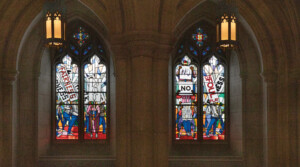The Rhode Island School of Design (RISD) is the latest school to announce a plan to address racial and social inequality. On July 22, President Rosanne Somerson released an open letter to the RISD community in response to the work of the student-led RISD Anti-Racism Coalition (risdARC), outlining 22 steps the arts and design school will take to support BIPOC students, faculty, and members of the surrounding Providence community.
On June 16, risdARC held its RISD & Race Forum 2020, where students (remotely) voiced their firsthand frustrations with institutionalized biases they had experienced at the school, especially in the wake of the protests against racial injustice that have been rocking the country after the killing of George Floyd in Minneapolis. A listening session with the administration followed on June 17, and after that students at RISD released department-based demands; students in the architecture department, for example, called the school’s previous responses to such efforts “an unconscionable form of performative allyship.”
Then, on July 1, risdARC compiled those concerns into BI+POC Student Demands, an 11-point list of action items RISD could take to implement institutional change, ranging from severing ties with the Providence Police Department to acknowledging the school’s role in the slave trade. The letter was then sent to all levels of RISD’s administration, faculty, and staff.
President Somerson’s response touches on a number of issues raised by risdARC (although some efforts, such as a tuition reduction, are nowhere to be found) but also lacks specifics in some areas, such as the commitment to recruit more students of color (risdARC had asked for a minimum of at least 30 percent).
The president’s letter also acknowledged that this was just a starting framework to build from, although many changes would take place in the near-to-immediate future:
We repeatedly heard from our community that the most definitive transformation we could make would be to increase the diversity of our faculty and that of their scholarship and pedagogy. I am pleased to announce that through the support of one of the largest gifts in our history, RISD will launch a cluster-hire initiative—the hiring of multiple scholars based on shared, interdisciplinary scholarship and research interests. This will bring 10 new faculty members to RISD in academic year 2021/22 with expertise in issues of race and decoloniality in the arts and design. This initiative will launch a fundamental transformation toward diversifying and expanding our curricula. Additional details regarding the gift and the cluster hire will be announced soon.
We are committed to consequential, scaled change. Evolving our college, museum and community is not just about eliminating racism; it is about being proactively anti-racist. These next steps for moving RISD forward are just that: critical next commitments. They should not and cannot be viewed as a simple checklist with a near-term endpoint. In the past few weeks we have heard from numerous voices that make clear the complexity and interrelationships of these issues. These will require ongoing, full-on efforts to make substantive, meaningful and durable change. This is the beginning of that change.
The letter is broken down into four sections: Cultivating a more diverse community (including faculty, students, the board of trustees, and art acquisitions); expanding and diversifying the curriculum and pedagogy (including introducing new social equity core courses and broadening non-Eurocentric world coverage); funding research on social equity and inclusion in art and design; and embedding “anti-racist and anti-discriminatory infrastructures across the college.” That last section is the longest and contains initiatives to beef up access to mental health services for BIPOC students, redirect funding from the public safety office toward additional training for public safety staff, document and expand the history of RISD to look any particularly racist aspects, rename its four “Plantations Buildings,” and support staff development related to social equity and inclusion.
Of course, RISD is far from the first school where students and alumni have pushed back against administrations for their response in addressing racism this year. Columbia’s Black Student Alliance at Columbia University’s Graduate School of Architecture, Planning, and Preservation released its own statement, On the Futility of Listening (backed up by the Black Faculty of Columbia GSAPP’s Unlearning Whiteness), and Yale, Harvard, Cornell, as well as many “non-Ivies,” have seen students release demands for their respective schools to create concrete plans to deal with systemic inequality.











